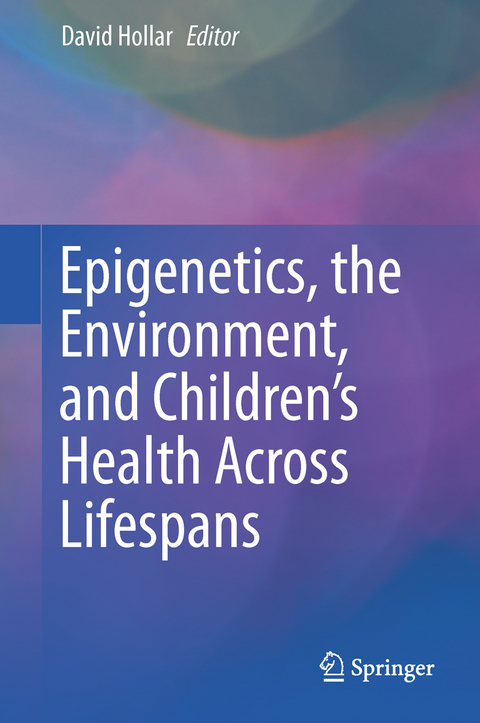
Epigenetics, the Environment, and Children’s Health Across Lifespans
Springer International Publishing (Verlag)
978-3-319-25323-7 (ISBN)
This stimulating volume addresses vital questions about gene/environment interactions as they affect cell health from the prenatal period through later life. Beginning with a tour of epigenetic processes in the human body, the book assembles current theoretical and empirical developments across the discipline, among them transgenerational epigenetic inheritance, the effects of maternal nutrition on epigenetic change, and possible links between epigenetics and childhood obesity. Public health and policy aspects of the field are discussed in depth, with the understanding that much can be done to improve our epigenetic health as a species. And in this vein, contributors consider future possibilities, such as the reprogramming of genes to reverse cancer and other diseases.
Included in the coverage:
- The role of environmental epigenetics in perinatal and neonatal development
- The epigenetic biomarker GammaH2AX: from bench science to clinical trials
- What's the risk? Dental amalgam, mercury exposure, and human health risks throughout the lifespan
- Post-traumatic stress disorder: neurological, genetic, and epigenetic bases
- Children's exposure to alcohol, tobacco, and drugs: long-term outcomes
- Ethical implications of epigenetics
Epigenetics, the Environment, and Children's Health Across Lifespans brings real-world knowledge and applications of this increasingly important field to public health practitioners, maternal and child health researchers, and environmental health experts.
David Hollar, PhD, MS is an Associate Professor of Health Administration at Pfeiffer University. He received his PhD in Curriculum and Teaching from the University of North Carolina at Greensboro, where he was awarded the graduate school's Outstanding Dissertation Award.Hollar successfully completed postdoctoral research in community health at the NIDRR-funded Rehabilitation Research and Training Center on Substance Abuse and Employment at Wright State University.His specialties include multivariate statistics, structural equation models, mathematical models, disability policy, and decision-making. Hollar has numerous peer-reviewed publications on health risk factors, allostatic load, behavioral genetics, and disability policy. He edited and coauthored the Handbook of Children with Special Health Care Needs, published by Springer in 2012. He has served on the editorial board of the Maternal and Child Health Journal since 2005.
Epigenetics and Development: A Natural Process.- Cause and Effect in Epigenetic Disease Epidemiology.- Epigenetics and Health.- Molecular Basis of Epigenetics.- Trans-generational Epigenetics.- Maternal Exposure to Pharmaceuticals.- Maternal Exposure to Poor Nutrition.- Maternal Exposure to Alcohol, Tobacco, and Drugs.- Maternal Exposure to Lead and Mercury.- Maternal Exposure to Stress.- Paternal Exposure to Environmental Mutagens and Stressors.- Protective Nutrition Before and During Pregnancy.- Protective Behaviors Before and During Pregnancy.- Impact of Dental Mercury on Lifespan Health.- Children's Exposure to Stress.- Children's Exposure to Lead and Mercury.- Children's Exposure to Alcohol, Tobacco, and Drugs.- Children's Exposure to Violence.- Children's Exposure to Traumatic Events.- Children's Exposure to Poor Nutrition.- Infection Impact on Child Development and Epigenetics.- HLA and Immune Response.- Allostatic Load.- Latent Periods and Cardiovascular/Cancer Risks.- Dynamics of Life Experiences on Polygenic Gene Regulation.- Food Chain Impact of Pesticides on Human Health.- Sun and Artificial Radiation Exposure on Skin Health.- Medical Imaging Radiation Risk on Health.- Naturopathic Approaches to Epigenetic Health.- Reprogramming Epigenetic Effects.- An Ecological Systems Approach to Epigenetic Health.- The Health Leader's Guide to Promoting Epigenetic Health .
"Gene/environment interaction are a young field of research, playing a great role on the intrauterine and postnatal development. The understanding of the significance of epigenetic mechanisms is clearly described in 16 chapters with a large list of references. For geneticists, neonatologists and pediatricians." (Pediatric Endocrinology Reviews (PER), Vol. 14 (2), December, 2016)
"The author describes the purpose as providing healthcare providers, policy makers, and healthcare consumers with a consultative resource to improve epigenetic health worldwide. ... It is directed at healthcare professionals as well as those interested in public health directives. ... Geneticists, as well as those involved in health surveillance such as cancer, may find this book very educational. ... It should raise awareness among the general public about epigenetics. There are very few books that deal with this subject." (Luis F. Escobar, Doody's Book Reviews, May, 2016)
| Erscheinungsdatum | 08.10.2016 |
|---|---|
| Zusatzinfo | XXI, 386 p. 24 illus., 16 illus. in color. |
| Verlagsort | Cham |
| Sprache | englisch |
| Maße | 155 x 235 mm |
| Themenwelt | Sachbuch/Ratgeber ► Gesundheit / Leben / Psychologie |
| Medizin / Pharmazie ► Medizinische Fachgebiete ► Gynäkologie / Geburtshilfe | |
| Schlagworte | children's environmental health • Environmental Health • environmental impacts on human genetics • epigenetics and human health • Epigenomics • Human genetics • maternal and child health • maternal exposure and birth defects • Medicine • pediatric epigenetics • Pediatrics |
| ISBN-10 | 3-319-25323-9 / 3319253239 |
| ISBN-13 | 978-3-319-25323-7 / 9783319253237 |
| Zustand | Neuware |
| Informationen gemäß Produktsicherheitsverordnung (GPSR) | |
| Haben Sie eine Frage zum Produkt? |
aus dem Bereich


